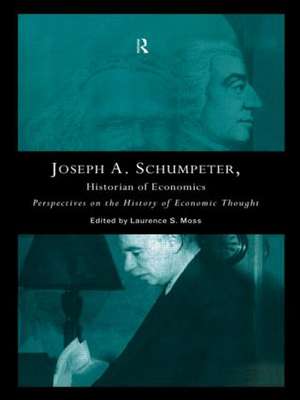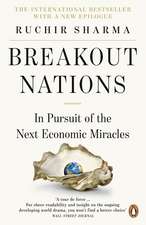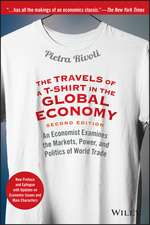Joseph A. Schumpeter: Historian of Economics: Perspectives on the History of Economic Thought
Editat de Laurence S. Mossen Limba Engleză Hardback – 4 iul 1996
Schumpeter's views on his predecessors have proved to be a constant source of controversy. Here individual chapters examine such disparate questions as Schumpeter's apparent disregard for the American Institutionalists, his grudging respect for Adam Smith, the perspicacity of his views of Quesnay and his preference for Walras over Pareto. Four chapters are devoted to the early Medieval schools, neglected in all of his writings. Schumpeter's magnum opus is related to the rest of his economic output, especially his views on money and on methodology.
With contributions by leading historians of economics from six countries, this volume analyses Schumpeter's contribution to the history of economics, considers its lasting significance, and uses it as a benchmark to assess the current state of the field.
| Toate formatele și edițiile | Preț | Express |
|---|---|---|
| Paperback (1) | 470.15 lei 6-8 săpt. | |
| Taylor & Francis – 28 aug 2013 | 470.15 lei 6-8 săpt. | |
| Hardback (1) | 1063.41 lei 6-8 săpt. | |
| Taylor & Francis – 4 iul 1996 | 1063.41 lei 6-8 săpt. |
Preț: 1063.41 lei
Preț vechi: 1296.84 lei
-18% Nou
Puncte Express: 1595
Preț estimativ în valută:
203.51€ • 211.68$ • 168.01£
203.51€ • 211.68$ • 168.01£
Carte tipărită la comandă
Livrare economică 14-28 aprilie
Preluare comenzi: 021 569.72.76
Specificații
ISBN-13: 9780415133531
ISBN-10: 041513353X
Pagini: 340
Dimensiuni: 156 x 234 x 21 mm
Greutate: 0.7 kg
Ediția:UK edition
Editura: Taylor & Francis
Colecția Routledge
Locul publicării:Oxford, United Kingdom
ISBN-10: 041513353X
Pagini: 340
Dimensiuni: 156 x 234 x 21 mm
Greutate: 0.7 kg
Ediția:UK edition
Editura: Taylor & Francis
Colecția Routledge
Locul publicării:Oxford, United Kingdom
Public țintă
PostgraduateCuprins
Part I: Methods of Scholarship 1. Assessing the Reprinting of Schumpeter's History of Economic Analysis Mark Perlman 2. Vision and Progress in Economic Thought: Schumpeter after Kuhn Roger E. Backhouse 3. Schumpeter's Treatment of Nonmainstream American Economics William Barber 4. Popularizers as Contributors to Economics: The Unappreciated Tribe Bette Polkinghorn 5. The Historiography of Economics: A Methodological Approach Annie L. Cot and Jerome Lallement Part II: The 'Great Gap' Thesis Revisited 6. The Inaccuracy of the Schumpeterian Great Gap Thesis: Economic Thought in Medieval Iran (Persia) Hamid Hosseini 7. Ibn Khaldun's Political and Economic Realism Louis Baeck 8. Maimonides on Property: Its Accumulation and Its Distribution Nelson P. Lande 9. Al-Maqrizi's Book of Aiding the Nation by Investigating the Depression of 1403-6: Translation and Commentary Mark Tomass Part III: Thoughts About Money, Credit, and Finance 10. A Test of Schumpeter's Approach to Money: The Case of the Sixteenth-Century French Monetary Debate Ghislain Deleplace 11. Banks, Credit, and the Financial System in Schumpeter: An Interpretation Richard Arena and Agnes Festre Part IV: Themes of the Classical School 12. Adam Smith's Invisible/Visible Hand/Chain/Chaos Spencer J. Pack 13. Jeremy Bentham on Private and Public Wages and Employment: The Civil Servants, the Poor, and the Indigent Nathalie Sigot 14. What Schumpeter Saw in Quesnay's Model: How the Tableau Economique Is Not a General Equilibrium or Input-Output Model Steven Pressman Part V: Expanding the Frontiers 15. Commons and Veblen: Contrasting Ideas About Evolution, Philippe Broda 16. Mr. Boulding and the Austrians: Boulding's Contribution to Subjectivist Economics Peter J. Boettke and David L. Prychitko 17. Economics as a Patriarchal Discourse Antonio Callari Part VI: The Synthesis 18. The Sociology of Science and Schumpeter's Ideology Yuichi Shionoya
Descriere
With contributions from leading historians of economics from six countries, this work analyses Schumpeter's contribution to the history of economics and uses it as a benchmark to assess the current state of the field.



















